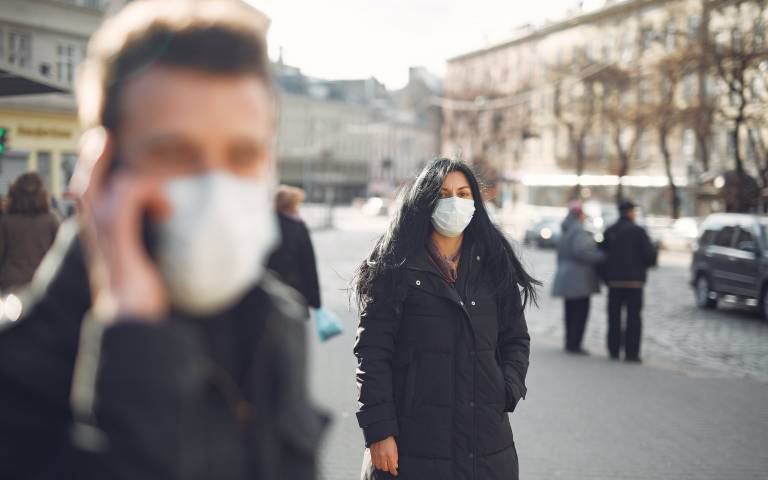Significant rise of ‘no confidence’ in government’s handling of Covid-19
29 October 2020
Over a quarter (27%) of people in England have said that they have ‘no confidence at all’ in the government’s handling of the coronavirus pandemic, up from just 6% at the start of lockdown, finds Dr Daisy Fancourt (UCL Epidemiology & Health) as part of the Covid-19 Social Study.

The number of people in England who ‘on balance’ do not have confidence in the government’s handling has also more than doubled in the last 6 months, from 25% at the start of lockdown to 56% now. Less than 5% of respondents in England report having ‘full confidence’ in the government.
In Wales, confidence remains higher, with a quarter (25%) ‘on balance’ not having confidence in the Welsh Government, an almost identical figure to the start of lockdown (26%). Just 6% of people in Wales report having ‘no confidence at all’ in the Welsh Government’s handling of the pandemic, the same as at the start of lockdown, and 15% have ‘full confidence’.
Levels of ‘full confidence’ in the Scottish Government remain higher than at the start of lockdown (17% vs. 10%) but have fallen significantly since the peak of 34% in July. Similarly, just over a quarter (26%) of respondents in Scotland ‘on balance’ don’t have confidence in the Scottish government, an improvement from 33% when lockdown came in, but down from 11% in early July. One in ten (10%) of people in Scotland have ‘no confidence at all’ in the government’s handling of the pandemic.
Launched in the week before lockdown started, the ongoing UCL Covid-19 Social Study is funded by the Nuffield Foundation with additional support from Wellcome and UK Research and Innovation (UKRI). It is the UK’s largest study into how adults are feeling about the lockdown, government advice and overall wellbeing and mental health with over 70,000 participants who have been followed across the last 28 weeks.
Lead author, Dr Daisy Fancourt (UCL Epidemiology & Health Care) said: “Confidence levels in the government have decreased markedly in England since the beginning of lockdown.
“This loss of confidence could be down to perceived government mismanagement of the pandemic coupled with a high number of Covid-19 cases in England. Early easing of lockdown in England and scandals such as government adviser Dominic Cummings’ journey to Barnard Castle appear to have contributed to the fall.
“The rising numbers of cases could also be to blame for the loss of confidence in Scotland and Wales, although both Scottish and Welsh devolved governments have seen a smaller reduction in confidence than the UK Government.
“This loss of confidence is deeply concerning as it is related to people’s willingness to follow guidelines and rules. So it is vital that the government listens to people’s concerns and tries to rebuild people’s trust.”
The study also found that just over one in 10 people (12%) are concerned that the NHS will not be able to cope with Covid-19, an improvement from the start of lockdown, but confidence has decreased as cases have risen. 78% of people are confident that the NHS can cope with Covid-19, with confidence higher in older adults and those living in rural areas.
Depression and anxiety levels, life satisfaction, happiness, and loneliness have stayed relatively stable over the past two weeks, but stress around catching or becoming seriously ill from Covid-19 has increased, with nearly half (45%) of people reporting feeling stressed about the issue, up from 37% a month ago.
The study team has also received support from Wellcome to launch an international network of longitudinal studies called the COVID-MINDS Network. Through the network, dozens of scientists and clinicians are coming together internationally to collate results from mental health studies running in countries around the world and compare findings. The initiative will support launching new mental health studies in other countries and show whether actions taken in specific countries are helping to protect mental health.
Links
- Dr Daisy Fancourt's academic profile
- UCL Department of Behavioural Science and Health
- Institute of Epidemiology and Health care
- UCL Faculty of Population Health Sciences
- The Nuffield Foundation
- Covid-19 Social Study
Image
Credit: Gustavo Fring Source: Pexels (CC.2.0)
Media Contact
Jake Hawkes
T: +44 (0)7747 565 05
E: j.hawkes [at] ucl.ac.uk
Read: Times (£), More: Times (£) (2), Evening Standard, i News, Mirror, Wales Online, New Statesman, UCL News
 Close
Close

